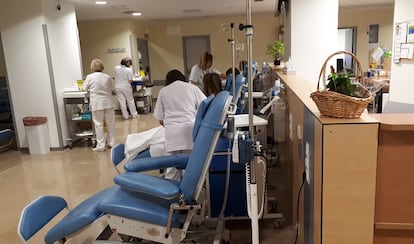Andalusia detects five cases of new Covid strain from UK, with four more under observation
Meanwhile in Madrid, the regional health chief is not ruling out the detection of more such patients, after several were confirmed on Saturday

Spain’s Andalusia region has detected five cases of the new, more infectious coronavirus strain that has been identified in the United Kingdom, the regional health department has revealed. A further four patients are being monitored in the provinces of Málaga and Granada, the department added. All of the patients in question are progressing well. In all cases, they had returned to the region after having been in the United Kingdom.
Of the confirmed cases, three reside in Málaga province, as well as those who are being monitored. The other two patients infected with the new strain have been located in the province of Granada.
The microbiology service at the Clínico San Cecilio Hospital in Granada, which has the capability to analyze the genome sequence of the virus, is examining the strains. Sources from this hospital have confirmed that the samples were taken very recently and were being analyzed on December 24 and 25.
All of the confirmed cases arrived from the United Kingdom, but the regional health authorities have yet to confirm the date of their arrival. It would, however, have been before December 22, which is when the Spanish government suspended flights from the United Kingdom apart from for residents or Spanish citizens. On the last day that flights were accepted without restriction in Spain, six flights from London arrived in Málaga airport.
These circumstances rule out the infections having originated in Gibraltar, the British Overseas Territory located in the south of Spain that borders Andalusia. Gibraltar’s first minister, Fabian Picardo, has stated that the new strain of the virus was detected in the territory at the start of November but added that the outbreak was under control.
The Andalusian government, which has been highly critical of the central government’s approach to controls in the region’s airports, called once again for a strengthening of testing in order to limit “the arrival of the coronavirus and its variations.”
Four cases in Madrid
Meanwhile, in Madrid, deputy health chief Antonio Zapatero said on Monday that it was likely that there would be “more confirmed cases” of the newly identified strain of Covid-19 in the region. Four cases have so far been identified while there are another three suspected cases that are still being analyzed.
Last Wednesday, the regional health department sent an alert to all healthcare centers in the region on the basis that the new strain, known as B.1.1.7, could already be circulating in Madrid.
Zapatero, who was speaking on Monday on TV network Antena 3 as reported by news agency EFE, pointed out that the new strain does not cause more serious cases of Covid-19, but is “more infectious,” something that could be a “problem for the management of the pandemic,” and could lead to “more patients infected.”
The regional health authorities in Madrid announced on Saturday the detection of the four Covid cases with the new strain first identified in the UK. Three of them are the father, mother and sister of a young man who arrived in Spain from the United Kingdom on Thursday. The fourth is another young man who arrived in Madrid from England on December 20. Both of the travelers in question presented a negative PCR test taken within the 72 hours prior to arrival, something that is currently required by the Spanish authorities when flying into the country.
English version by Simon Hunter.
Tu suscripción se está usando en otro dispositivo
¿Quieres añadir otro usuario a tu suscripción?
Si continúas leyendo en este dispositivo, no se podrá leer en el otro.
FlechaTu suscripción se está usando en otro dispositivo y solo puedes acceder a EL PAÍS desde un dispositivo a la vez.
Si quieres compartir tu cuenta, cambia tu suscripción a la modalidad Premium, así podrás añadir otro usuario. Cada uno accederá con su propia cuenta de email, lo que os permitirá personalizar vuestra experiencia en EL PAÍS.
¿Tienes una suscripción de empresa? Accede aquí para contratar más cuentas.
En el caso de no saber quién está usando tu cuenta, te recomendamos cambiar tu contraseña aquí.
Si decides continuar compartiendo tu cuenta, este mensaje se mostrará en tu dispositivo y en el de la otra persona que está usando tu cuenta de forma indefinida, afectando a tu experiencia de lectura. Puedes consultar aquí los términos y condiciones de la suscripción digital.








































